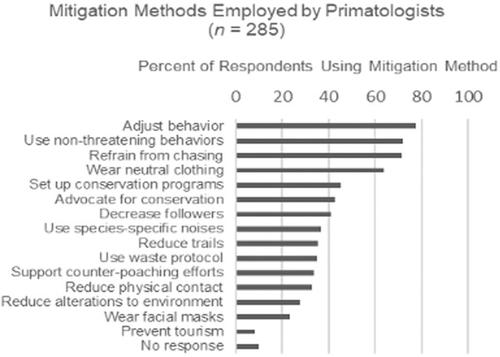当前位置:
X-MOL 学术
›
Am. J. Primatol.
›
论文详情
Our official English website, www.x-mol.net, welcomes your feedback! (Note: you will need to create a separate account there.)
Researchers' ethical concerns regarding habituating wild-nonhuman primates and perceived ethical duties to their subjects: Results of an online survey.
American Journal of Primatology ( IF 2.4 ) Pub Date : 2020-07-23 , DOI: 10.1002/ajp.23178 Victoria M Green 1 , Kara I Gabriel 2
American Journal of Primatology ( IF 2.4 ) Pub Date : 2020-07-23 , DOI: 10.1002/ajp.23178 Victoria M Green 1 , Kara I Gabriel 2
Affiliation

|
While the process of habituation is essential for researchers to observe primates in their natural habitats, ethical dilemmas may arise from its consequences. We collected data from 286 participants via an online survey to investigate: (a) how primatologists perceive their ethical duties toward their subjects; (b) the extent to which primatologists are concerned about the potential ethical consequences of habituation; and (c) the methods primatologists use to reduce potential harms caused by habituation. Overall, primatologists felt an extremely strong duty to mitigate harms that they may cause (e.g., to not stress individuals during observation, treat injuries, and reunite separated individuals) and expressed very high concern for habituation's potential to increase the vulnerability of their subjects to poaching and disease transfer. Ratings for those items were so high that they could not be included in subsequent exploratory factor analyses that were designed to reveal constructs underlying respondents’ ratings of their ethical duties and concerns. Factor analysis of ratings of ethical duties revealed that primatologists reported a strong duty to mitigate harms caused by other humans and a lower perceived duty to mitigate naturally occurring harmful events. Factor analysis on ethical concern ratings revealed that respondents were concerned about harms during the habituation process, the presence of unhabituated behavior after habituation had been established, and indirect harms of habituation. Concerns for unhabituated behavior and indirect harms were rated slightly higher than concern for harms during the habituation process. To mitigate potential harms, primatologists primarily reported engaging in strategies to reduce stress in their subjects. Our findings reveal a disconnect between primatologists' ratings of their ethical concerns and their reported mitigation practices that may, in part, stem from gaps in knowledge about the true impacts of habituation. We suggest areas of discussion and research in the field necessary to address those gaps.
中文翻译:

研究人员在习惯野生非人类灵长类动物和对受试者的道德责任感方面的道德关切:在线调查的结果。
虽然习性过程对于研究人员在自然栖息地观察灵长类动物至关重要,但其后果可能会产生伦理困境。我们通过在线调查从286名参与者中收集了数据,以调查:(a)灵长类动物学家如何看待他们对受试者的道德责任;(b)灵长类动物学家对习惯化的潜在伦理后果的关注程度;(c)灵长类动物学家用来减少习惯化所造成的潜在危害的方法。总体而言,灵长类动物学家认为,减轻其可能造成的伤害(例如,在观察过程中不对个人施加压力,治疗受伤并使团聚的个人重新团聚)负有极其强烈的责任,并对习惯化可能增加其被盗猎者的脆弱性的潜力表示高度关注和疾病转移。这些项目的评级是如此之高,以至于不能将它们包含在随后的探索性因素分析中,而该探索性因素分析旨在揭示被调查者对其道德责任和关注点的评级。伦理义务等级的因素分析表明,灵长类动物学家报告说,他们有减轻人为伤害的强烈责任,而减轻自然发生的有害事件的责任却较低。伦理关注度等级的因素分析显示,受访者关注习惯化过程中的危害,习惯化后存在非习惯性行为的存在以及习惯化的间接危害。对不习惯的行为和间接伤害的关注被评为略高于在习惯化过程中对伤害的关注。为了减轻潜在的危害,灵长类动物学家主要报告说正在采取减少其受试者压力的策略。我们的发现表明,灵长类动物学家对他们的伦理问题的评价与他们所报告的缓解措施之间存在脱节,这可能部分是由于对习惯化真正影响的认识空白所致。我们建议在该领域中解决这些差距所必需的讨论和研究领域。
更新日期:2020-08-26
中文翻译:

研究人员在习惯野生非人类灵长类动物和对受试者的道德责任感方面的道德关切:在线调查的结果。
虽然习性过程对于研究人员在自然栖息地观察灵长类动物至关重要,但其后果可能会产生伦理困境。我们通过在线调查从286名参与者中收集了数据,以调查:(a)灵长类动物学家如何看待他们对受试者的道德责任;(b)灵长类动物学家对习惯化的潜在伦理后果的关注程度;(c)灵长类动物学家用来减少习惯化所造成的潜在危害的方法。总体而言,灵长类动物学家认为,减轻其可能造成的伤害(例如,在观察过程中不对个人施加压力,治疗受伤并使团聚的个人重新团聚)负有极其强烈的责任,并对习惯化可能增加其被盗猎者的脆弱性的潜力表示高度关注和疾病转移。这些项目的评级是如此之高,以至于不能将它们包含在随后的探索性因素分析中,而该探索性因素分析旨在揭示被调查者对其道德责任和关注点的评级。伦理义务等级的因素分析表明,灵长类动物学家报告说,他们有减轻人为伤害的强烈责任,而减轻自然发生的有害事件的责任却较低。伦理关注度等级的因素分析显示,受访者关注习惯化过程中的危害,习惯化后存在非习惯性行为的存在以及习惯化的间接危害。对不习惯的行为和间接伤害的关注被评为略高于在习惯化过程中对伤害的关注。为了减轻潜在的危害,灵长类动物学家主要报告说正在采取减少其受试者压力的策略。我们的发现表明,灵长类动物学家对他们的伦理问题的评价与他们所报告的缓解措施之间存在脱节,这可能部分是由于对习惯化真正影响的认识空白所致。我们建议在该领域中解决这些差距所必需的讨论和研究领域。


























 京公网安备 11010802027423号
京公网安备 11010802027423号